By Carol Tannenhauser
When asked what she wanted to do, my 17-year-old goddaughter, visiting from California the week before Christmas, didn’t hesitate: “Go shopping,” she said. But it wasn’t the department stores of the East Side that beckoned her; it was the shops along Columbus and Amsterdam Avenues, West 72nd Street and Broadway that she wanted to explore. We spent a wonderful morning meandering in and out of local stores, shopping bags filled with presents piling up on our arms.
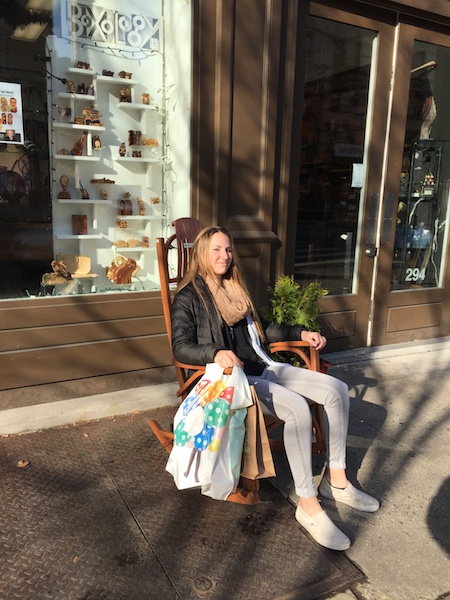
Tyler takes a break in front of An American Craftsman on 74th and Columbus.
Along the way, we passed the empty shell of Isabella’s, a neighborhood institution that closed in May, literally, overnight. Next to it, the woman’s clothing store Babette was also shuttered, as was the old location of KTCollection jewelry, a few blocks down. KTCollection is now located in the former home of Roslyn, the jewelry and hat store named for its flamboyant owner, who called it quits last year after two decades. Around the corner, we passed what was Amaryllis, a 29-year-old neighborhood florist that closed its doors in April.
Amaryllis was the first store we profiled in our Small Business Focus series, launched in 2017 to do the best thing we could think of to support local businesses (besides shop in them): give them exposure. Amaryllis was doomed before we started the series. Lou, the owner, had given up, saying it was just too hard to do business in the city. Yet, the other stores we profiled are holding on, even thriving.
So, what is the retail reality on the Upper West Side, in a time that experts around the country are calling “America’s Retail Apocalypse”?
Statistically speaking, not that great. A Small Business Health Report published by City Council Member Helen Rosenthal in November stated that of the 1,332 storefronts on the Upper West Side, “12% (161) were unoccupied” as of this summer. The New York Times reported that “healthy vacancy levels [are] generally defined as about 5 percent.” “Of the major commercial streets, Broadway and Amsterdam Avenue had the highest percentage of empty storefronts,” Rosenthal’s report stated. “Broadway had the largest number of empty storefronts (57), followed by Amsterdam Avenue (44) and Columbus Avenue (32).”
On the plus side, the report said, “According to the West Side Rag…94 businesses have opened so far this year, and 63 businesses have closed. We’re ahead of the curve. Yes, Caesar’s Pizza, 72nd Street Bagel, and Bourbon Street Bar are gone, but J.G. Melon, Mama’s Too, My Pie, Maison Pickle, and Books of Wonder are here. Yes, we lost West Side Market and Artie’s, and Lincoln Plaza Cinemas is set to show its last film sometime in January. Okay, there are no words.
Last month, the City Council took a step toward helping small businesses survive by raising the threshold at which the city’s Commercial Rent Tax kicks in, providing nearly 3,000 businesses with some relief.
As for “greedy landlords,” generally blamed for the demise of Mom-and-Pop shops, our series revealed some “decent” ones as well, willing to work with their tenants. To paraphrase a nursery rhyme, “When they are good, they are very, very good, and when they are bad, they are horrid.”
Word is the market is already “self-regulating”; commercial rents are coming down. Wrote the New York Post in November, “Along Broadway from West 72nd to 86th Street, rents are down 15 percent from a year ago and 8 percent since spring to an average of $291 per foot. Similarly, along Columbus Avenue from West 66th to 79th Street, rents were down 16 percent from the fall of 2016, and another 2 percent since this spring to $338 per foot.”
The other major factor is the internet: bricks and mortar faces long odds against the convenience of shopping from the couch. This series (and my goddaughter) showed me the difference between just buying things and shopping. Shopping is a social experience, a chance to meet interesting and diverse people, devoted to their businesses and community, and to build relationships with them. There’s something immensely comforting about being a regular.
WSR will continue our Small Business Focus series in 2018. Please send us the names of your favorite local stores — the ones that would break your heart if they closed. We’ll profile as many as we can. And you…shop local!
You can read our previous small-business profiles here.



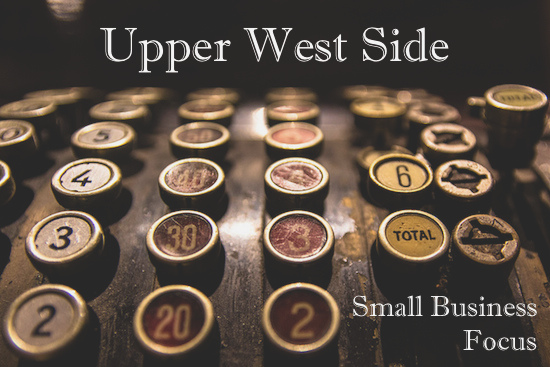

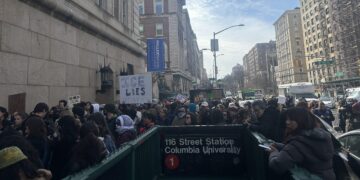

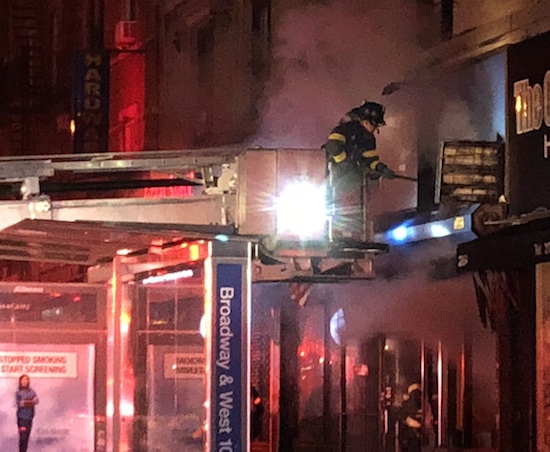

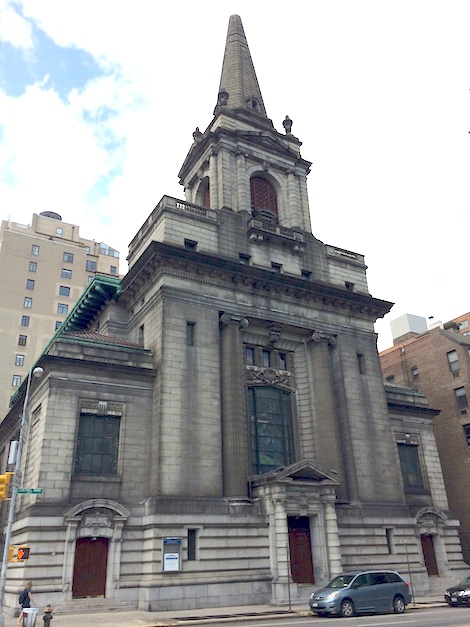
No market is self regulating! This is particularly true when landlords can benefit from leaving their retail spaces empty. The City has incentivized the destruction of small business and it will continue to do so. Unfortunately for “Mom and Pop”, they can’t provide the kinds of checks that get the mayor and others to pull strings or pay attention to their interests.
Pedestrian, there is no benefit derived from leaving retail space vacant. There is no tax benefit other than the fact that you receive less income and therefore pay less tax. It would be similar to taking a cut in salary just to pay less in taxes. Furthermore, when a space is vacant you not only lose the rental income and the contribution by the tenant to your real estate taxes, but you also incur the broker fees and renovation costs incurred when the space is rented. The internet has fundamentally changed how we shop and will also change the office market as more people work remotely from home.
I may be wrong but my understanding is that landlords may report a “loss” against their other real estate income for commercial property that is vacant at the “fair market value” rent for that space. Mearning that if Mom and Pop’s 10 year lease at $15,000 per month expires and Landlord raises the new rent to $50,000 per month and Mom and Pop close because they cannot afford that, the landlord can report a “loss” at $50,000 per month for each month that the commercial space remains vacant if a reasonable argument can be made that the rent at the new amount is FMV for that space. (I may be simplifying a bit here, but I think that is generally how it works. This may not be an advantage for a smalll landlord that does not have a lot of other properties but it’s worthwhile for others). Any tax accountant s out there who can confirm or correct this?
Suze, unfortunately uour understanding is incorrect, losses are generated when expenses exceed income. The absence of rental income from a vacant space is not an expense item that can be deducted at fair market rental value, it is simply less income.
I can’t believe that this has to be explained to someone. A simple internet search yields numerous plain-English explanations of the tax mechanism for commercial real estate. All the sources confirm that one cannot deduct lost rent.
The whole concept of a landlord setting an arbitrary rent level as the “fair market value” and then DEDUCTING that as a loss is beyond my imagination with all the information that is available to us. The fact that another person’s comment agreed with the original comment makes my head explode.
Suze:
re: landlords reporting a “loss” on the vacant space:
I’m Not a Tax Accountant (INATA!) but i have looked into this, and my understanding is that “Landlord’s” statement above is correct.
if a vacant store lies empty, the building simply has less income, similar to if an apartment lies empty. the building as a whole with either show a profit or a loss, based on income and expenses. Presumably there are expenses that can be attributed to a vacant store,such as broker costs, costs of improvements, and so on. but setting an arbitrary rent and then subtracting that as “lost income” is not among those costs.
now, what i HAVE heard is that the bank lenders play a role in vacant stores. when landlords take out a mortgage loan, they describe the potential cash flow of the building, including its retail spaces. a cash flow in a retail space below what is described might trigger a re-evaluation by the lender, and presumably the recasting of the terms of the loan. if the space remain vacant at a higher asking rent, this would not take place.
Bruce, you are correct about lenders. Many mortgages have provisions that require landlord’s to rent empty space at rents equal to or greater than the previous rent (i.e. the rent at which the lender based its mortgage loan). That being said, most lenders are aware of the retail market and would generally consent to renting at a lower rate as long as the building has sufficient cash flow to pay the mortgage and meet its operating expenses.
Yes Suze, you would be about right. Think about that and let it sink in. That’s more than enough reason to keep these businesses empty if you’re the landlord. Most of these landlords are no longer the small family enterprise. Many are now owned by private investment companies and mega real estate. It’s city and state government who have to date done absolutely nothing to regulate these egregious practices turning NY neighborhoods into blighted retail ghettos.
Ground Control, I respectfully disagree with your conclusion that it is up to the government to solve the crisis caused by the shift in buying habits from instore shopping to online shopping. If we want retail stores to succeed it is up to us to shop at these stores. I believe the WSR is doing its part to focus on small businesses. Perhaps it would be helpful if the WSR did a survey of its readers for each 10 block area, by avenue, on the upper westside asking what type of small business they feel their neighborhood needs. This could help landlords and brokers find the busnesses that would prosper in these locations and help maintain the character of the upper westside.
GroundControl:
I am firmly in the camp that believes that commercial real estate prices should be regulated or in some way controlled and that leaving the storefronts open is an egregious practice by greedy landlords.
However, i believe the idea that they can expense the vacant stores at any price they want is a myth. Do you have a source for this? I have looked into the claim at length and have not found any evidence for it.
a vacant store simply produces no revenue, not “negative” revenue.
This confirms that you’re not Suze Orman.
Can you please explain how the city has “incentivized the destruction of small businesses” and how landlords “benefit from leaving their retail spaces empty”?
Im sorry when small businesses go under but what you’re writing is ignorant nonsense.
Jeff Bezos is far more responsible for empty stores than greedy landlords or some mysterious benefits afforded upon landlords for leaving their property empty.
Pedestrian, You write, “This is particularly true when landlords can benefit from leaving their retail spaces empty.” I am not familiar with this. Can you explain?
Mama’s Too is my new favorite pizza slice.
Ernesto’s Jewelry
Smith+Morgan hair salon (205 W 80 St.)
Broadway Farms
Broadway Chemist
Toscana shoe repair
Pinky’s
Price Wise
Mike’s Lumber
Coppola’s
Hi Life Bar and Grill
I’ll second BROADWAY FARM on 85th and B’way.
They just did a huge renovation and it looks amazing. More open layout, so clean you could eat off the floor (although I wouldn’t recommend it), great produce, friendly family business, etc.
It’s not a discount store so it’s not super cheap but it is worth it IMHO. It’s still cheaper than Gristides, which may be the worst grocery store in the city.
Mama’s Too has the best slice on the UWS, and possibly the best slice in all of Manhattan, as you could only get a comparable slice downtown if you purchased an entire pie “no slices”. My only complaint is that it is too light on the cheese, but the lack of cheese does make the great sauce and incredible dough shine. Plus cheese is really unhealthy and since I’m over 40, I should limit my cheese intake.
Cheese is not unhealthy. Over-40 folks should eat cheese EVERY DAY; -not cut back.
The best slice on the UWS is and always will be Sal and Carmine’s.
they are the most overrated slice in all of Manhattan. I don’t get the loyalty of people like you to that place. The pizza tastes like eating a piece of salt on undercooked dough.
Is there a way to help keep the Lincoln Plaza Cinema to remain open!
I found this online: https://www.indiewire.com/2017/12/lincoln-plaza-cinema-closing-reopen-talbot-milstein-1201908539/
However, IndieWire learned from multiple sources that, a year ago, Milstein spoke with at least one party as a future credible operator: the nonprofit Film Society of Lincoln Center. That might suggest his company maintained real interest in continuing the theater, with similar programming.
‘When asked if Milstein approached other parties, a spokesperson had no comment.
Similarly, a spokesperson for the Film Society had no comment when asked to confirm that these meetings took place.’
Just found out The Loft on Broadway and 69th is closing in January. It’s a great place to buy inexpensive clothes (even petites) and gifts. They said the lease was up. Same old story of greed. My friends and I will miss it!
Joseph’s on 72nd
M Salon
Papyrus
Tip Top Shoes
The Birdcage
Price Wise
Fine and Shapiro
Polpette 71 on 71st
Sensuous Bean. The last native business in the Lincoln Square neighborhood I believe, besides 67 Wine. (Can’t say that with 100% certainty.) It’s hard for them to compete with Fairway and Zabar’s $10/lb. pricing, but they make up for it with the best beans!
Beacon paints is a wonderful place with helpful dedicated owners. We cannot lose them. Ever.
And who wants to get dressed without Daryl’s to dress one? What a fabulously curated store! Perfect for a woman of a certain age who isn’t ready to give up “hip”!
Thank you for this article. We are SO happy Bird Bath is back in town!!!
We LOVE Orwasher’s! Everyone in there is beyond nice and helpful
White Gold is a huge plus for us. They continue to offer many services that most butchers do not
The problem (if there is a problem) is that a lot of the retail around here isn’t particularly interesting or useful. Entrepreneurs seem to have run out of ideas; I mean how many juice bars do we really need? Meanwhile we don’t have an auto parts store around where I can pick up a battery when mine goes dead. Useful is the key word. If you look at retail here back in the 1930s every single store served a real purpose.
Scott you certainly hit the nail on the head. Look around at the local businesses and their success rates. The vast majority of retail storefronts in our neighborhood are selling luxury, non-essential items i.e. coffee, juices, skin care, high end clothing, shoes, and accessories, wine, etc. We need essential goods at a fair price like groceries…I’d love to go back to the days of buying meat at the butcher and bread from the baker but alas those days are long gone.
Book Culture on 82nd & Columbus
Giacomo’s on West 72nd St.
Joseph Pharmacy on W. 72nd St.
Levain Bakery, the original on W. 74th St.
Pier 72 on West End Ave.
Polpette on W. 71st St.
Cafe Margot on W. 74th St.
Thanks!
The owner of Amaryllis did everything he could to keep his lease and the landlord said no to all offers because he had a coffee/cafe place all set to move in that was more in tune with the neighborhood. It’s now nine months later and the place is still empty. What happened?!
I forgot to add, that I would miss Stationary and Toy World, Pet Land, Fine & Shapiro, and Gartner’s Hardware. Last but not least, West End Superette, which I just discovered when I needed salad items and didn’t have the energy to stand in line at Trader Joe’s or Fairway, lol.
Gartner’s Hardware
Pet Central
The Paint Place
Book Culture
Paper House
Petland Discount
The Pet Market
Pasha Turkish Restaurant
Jacques Torres
Pro Image
Ansonia Dry Cleaners
Please profile Stoopher and Boots! Amsterdam Ave between 78th and 79th. Highly curated kids clothing, accessories and gift items. Our daughter and her friends practically grew up there under the amused eyes of owner Stephanie and her dog Scout.
Gastronomie 491
Park West Pharmacy
Zingone’s
Thank you for this insightful article providing information and advise on how we in the community can assist in patronizing our neighborhood stores before we mour their departure. My heart brakes with the loss of West Side Market but hope they return to a location near us.
I’d like to recommend the restaurant Bodega 88 for one of your piece as it has a lovely story on how the determination of the owners have provided our neighborhood with a great place to eat, drink and meet old and new friends. Visit the location, you will not be disappointed.
Book culture and Magpie are wonderful. Savvy selection of books and gifts respectively; plus friendly and knowledgeable people working there make for a pleasant experience every time. The children’s selection at book culture is also a big plus!
I think those of us who have lived in the neighborhood for decades can spot a new store or restaurant doomed to fail. My record is pretty damn good.
Giacomo
Joseph pharmacy
Santa Fe
Polpette 71
Cafe Luxembourg
Bella Luna
I showcase local businesses on the Upper West Side on my video series #WestSide Wednesdays. While it hasn’t solved
the shop local issue, the business owners have told me they
have received new customers from the videos. https://www.youtube.com/channel/UCLUSoqz23i7ZMCJ09d4i8WA?view_as=subscriber
I’d like to add CU Launderette to the list. I’ve used 10+ different laundries over the last 40 years and this is the ONLY place I’ve found that stays open on Sunday and has my laundry clean, soft, and folded perfectly, and always ready on time. They have a very small staff who work efficiently and I hope they never go out of business!
Murray’s
French Roast
I lived on Columbus between 77th and 78th Street from 1977 – 2006. Rent was $230/month for a 1BR when I moved in. The neighborhood has lost many small businesses and gone through many changes since that time.
https://www.westsiderag.com/2011/10/05/photographer-unearths-pictures-of-lost-upper-west-side-storefronts
https://www.westsiderag.com/2013/11/24/a-writer-shares-1980s-uws-memories-and-asks-for-yours
West Side Kids. The perfect toy store.
Call me simplistic but I continue to be puzzled by all of the empty storefronts. Owners know well ahead of time when a lease is ending. They should be lining up new tenants well ahead of time. If it is approaching the end of the lease and the owner hasn’t found a new, more lucrative tenant, why don’t they extend the existing tenant on a short term lease at roughly the current rate. That way there continues to be income but if the dream tenant actually shows up (highly unlikely), they can swap tenants relatively quickly. What am I missing?
Carlos said:
“Call me simplistic but I continue to be puzzled by all of the empty storefronts. What am I missing?”
I too was puzzled, and have looked into it.
As best as I can figure out, the vacant storefront contributes to the VALUE of the building. apparently when it comes to resale, “two birds in the bush are worth a bird in the hand.” it’s similar to selling a building with vacant apartments… more valuable than if the apartments were occupied with rent stabilized tenants.
As for filling the vacant storefront with short term leases, there is some of that on the UWS… but i don’t think that many short term tenants are available. why would a store make investments when it can be kicked out at any moment?
in addition, often the mortgages have clauses that say that a certain amount of cash flow will be achieved through the retail portion of the building. If the potential cash flow moves below that amount (leases signed at a lower level), the lenders can restructure. if the store remain vacant, apparently they cannot.
From the NY Times:
” …building owners who purchased their properties in recent years with the expectation that rents could only continue to rise may be in a bind. To secure financing, they would have to project a certain level of income, and if they accept less than that, they run the risk of being in default, or having their lender require them to put more equity into the building. At some point, Mr. LaPierre said, those owners will lose their buildings or have to find a partner willing to invest money in the property.”
https://www.nytimes.com/2017/08/23/nyregion/soho-empty-storefronts.html
This couldn’t be further than the truth. Commercial building valuations are based on present and future cash flows associated with existing leases. An empty space contributes zero cash flow and dings the value big time. If you were a buyer would you pay the same price for identical buildings with one being 90% leased for the next 15 years versus one being 40% leased? It’s simple math and nothing more. So again, there is NO BENEFIT for landlords to keep spaces vacant on purpose! Stop with the uneducated nonsense!
Commercialguy says:
“So again, there is NO BENEFIT for landlords to keep spaces vacant on purpose! Stop with the uneducated nonsense!”
why, then, with vacancy rates on the UWS over 12%, do commercial rent prices not come down?
why do many (not all, but many) landlords continue to ask exorbitantly large increases on renewal?
why were some businesses that were there for DECADES, successful businesses, evicted because they could not pay the large increases? and then the store lies vacant for YEARS? one that readily comes to mind is the former appliance store, RCI, on the W Side of Bway, i think the corner is 98th or 99th?
i would be knowing what you think the cause is of the large vacancy rate. it is not simply “the Internet.” And, if anything, online shopping should result in DECREASED commercial rents, if the “free market” was doing its job.
it’s interesting that CommercialGuy’s argument comes down to landlord greed. He is saying that the landlords are “flush with cash” and would rather leave the spaces empty, on the pure speculation that they can land an exorbitant rent, than rent them out at reasonable (and still profitable) rates.
neither CommercialGuy nor GG, both of whom claim i know nothing about “free markets”, seems to understand my point about the online shopping, which is “free market” 101: online shopping creates less of a demand for commercial space… which, according to the laws of supply and demand, should lower the cost (rent) of commercial space.
but there appears to be a “Market failure” in the retail rent market in Manhattan. CommercialGuy attributes it to pure greed. I think there are some other reasons as well.
GG’s attack on the pensions of public sector workers — teacher, cops, firemen, nurses, social workers, in other words, the people who keep NYC running — was gratuitous. these pensions have nothing to do with the rise of commercial rents. Public workers get low pay compared to the private sector, and pensions are part of our compensation. it’s sad when some people want to single out public sector workers for abuse.
It all boils down to CASH! Commercial properties are generally cash cows and landlords who own multiple properties are generally more than flush with cash so they can afford to hold out for the highest rent per sf. If they weren’t able to pay their obscene property tax bills, mortgage payments, insurance, and general maintenance of the building at current vacancy rates they wouldn’t have the choice but to rent out the space at a lower rate in order to generate the cash to do so.
In addition, most consumers do not know that in the commercial rental market it is the LANDLORD that pays for any tenant improvement costs which can run hundreds of thousands of dollars and even millions in many large spaces. There are commercial broker commissions also paid by the LANDLORD and many times there are free rent concessions that can span for years. These elements of commercial leases all go into the equation of whether it is a wise decision to enter into a lease with a tenant who needs to generate enough cash by selling coffee, juice, shoes, groceries, whatever just to pay the rent. So while it appears on the surface that landlords are greedy and benefit from vacant spaces, it is an incorrect assumption. Nothing is that cut and dry.
Oh and finally, internet shopping and delivery services have dramatically changed the retail landscape whether you’d like to believe it or not so that isn’t helping the situation either.
What?!!? My head is spinning from this. You need to go educate yourself a little about the commercial real estate business before you get on here and speculate all of your uber-liberal nonsense.
Do you know what a free market even is? Anyway, if you want to investigate something look into PROPERTY TAXES. Remember….follow the money….right into the bloated social programs and pension funds of all of our city employees. Sound familiar? I bet it does.
Carlos said:
“Call me simplistic but I continue to be puzzled by all of the empty storefronts. What am I missing?”
I too was puzzled, and have looked into it.
As best as I can figure out, the vacant storefront contributes to the VALUE of the building. apparently when it comes to resale, “two birds in the bush are worth a bird in the hand.” it’s similar to selling a building with vacant apartments… more valuable than if the apartments were occupied with rent stabilized tenants.
As for filling the vacant storefront with short term leases, there is some of that on the UWS… but i don’t think that many short term tenants are available. why would a store make investments when it can be kicked out at any moment?
in addition, often the mortgages have clauses that say that a certain amount of cash flow will be achieved through the retail portion of the building. If the potential cash flow moves below that amount (leases signed at a lower level), the lenders can restructure. if the store remain vacant, apparently they cannot.
In terms of the short term leases, I meant that they should offer these to the existing tenant. So they should say they don’t want to extend long term because they are hoping for a more lucrative offer, but they will extend for a year at roughly the current rate. So the current tenant can continue business as usual and the owner can continue to at least get some income while shopping the place for a better offer.
I completely agree that a short term lease for a new tenant doesn’t usually make sense, though the Halloween pop-up shops and such do seem to make it work.
Please profile MONDELL’S CHOCOLATES
2913 Broadway at 114 th st.
The only home-made chocolate shop on the UWS, and have been in business since 1943.
they do well on holidays like Valentine’s Day, Easter and the winter holidays but could use some support throughout the year.
Silver Moon Bakery
Miss Mamie’s Spoonbread Too
Absolute Bagels!!!!!
You could have reported on the state of small business without all the personal biases and emotions that you included. Your putting the blame on “greedy landlords” and the internet don’t give your article much integrity.
What I meant to say is that you project your personal view about internet shopping through statements like this:
“This series (and my goddaughter) showed me the difference between just buying things and shopping. Shopping is a social experience, a chance to meet interesting and diverse people, devoted to their businesses and community, and to build relationships with them. There’s something immensely comforting about being a regular.”
Your views aren’t necessarily the views of others who couldn’t care less about shopping being a social experience. Sometimes, they just want their stuff quickly and easily.
According to your logic, people should dine out for the social experience instead of cooking at home. Wouldn’t have much need for supermarkets and grocery stores then. Is that what you do?
I can’t bear to think of Lincoln Plaza Cinemas closing! It’s my favorite movie house and I have been going there since 1990. I also like the little Indian restaurant on Columbus called Indigo (I think!) in the 60s.
Forgot to mention Pioneer Supermarket on Columbus between 73rd and 74th. also ProImage Photo on Amsterdam and 74th; Beacon Hardware; Raku the Japanese Restaurant on West 76th St.
It’s truly sad to see so many small businesses going under on the UWS. I feel it kills a little bit of the neighborhood every time a mom & pop shuts down and a chain store or bank takes it place. Pretty soon we will be losing out “neighborhood” feel that so many have come to love about the UWS. As a small business owner and UWS resident, I try my best to frequent the smaller shops. Not only are you helping a business stay afloat, but I also feel you get a lot more social interaction and connection from the small business owner who is eager to assist you rather than just give you a generic answer. Shopping Small should not just be a once a year event but, rather, a preference for all those looking to keep our neighborhood intact. If we all do our parts, we can save the UWS and turn this trend around so that more small business owners are drawn here and set up shop in our neck of the woods.
You should profile Paramus or the Short Hills Mall, to capture the flavor of what the neighborhood will be in 5-10 years.